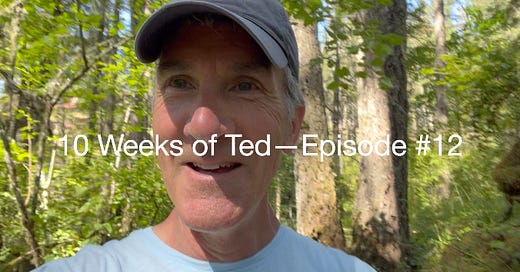“It’s not about me—it never has been.”
If only life could be that simple—that easy—as to read, understand, and embrace something so profound that it changes how we get out of bed every single morning.
For those of you who have been watching Ted Lasso on Apple TV, you’ll recognize this simple and compelling line from the season’s finale. It was a moment when Ted, a football (soccer) coach and the show's main character, shared some feedback with Trent, a soon-to-be author of a book celebrating Ted and the remarkable work he had done in shaping his AFC Richmond professional football team’s culture.
Trent’s working title was “The Lasso Way.” Understandably. To know the show is to appreciate the impact of Ted, his coaching style, and the healthy, respectful, and loving team culture it built. However, in classic Lasso style, Ted reminds us that his coaching isn't and never has been about him.
But, like so many streaming shows that follow a repeating annual 10-show season, in this example, it wasn’t the football that drew millions of viewers back each week over its three-year run. Myself included—I mean, I like soccer, but… not that much!
So, what was it—what was it about Ted Lasso, the show, that kept people coming back for more? And not just me—have a quick look online—numerous podcasts and articles dedicated to digging into the Ted Lasso phenomenon. Leadership pieces in Forbes, Inc.com, LinkedIn, you name it—apparently, there are a lot of leadership tidbits on offer with Ted.
Granted, one has to acknowledge the acting, the storyline, production—all of it professional and exceptionally well done. Agreed, that’s contributed on some level. But it’ll only get you so far—there’s had to be more to create such lasting allure.
At first glance, I believe the easy answer is that watching Ted Lasso makes you feel good—it was indeed the quintessential “feel-good show” of the last three years. And with that said, the timing of Ted’s release probably didn’t hurt either. It arrived on our television screens just when we all needed to feel good or, at the very least, better than most of us were feeling about the general state of the planet.
Covid and all its prickly parts have left lasting legacies—disconnection being one of them. Our human race has grown apart. However, Ted was our weekly chance to mend that—to reconnect with characters who made us laugh, cry, and cheer.
Some of those characters even shared struggles that many of us could relate to—dysfunctional parents, paralyzing insecurities, limiting masculine beliefs, abusive partnerships, racial and homophobic injustice—the list is long and caustic.
However, what I find most exciting and, let's face it, encouraging, as well, is that the narrative of Ted offers an alternative to what we’ve grown up knowing in sports, business, and life. And we loved it!
Instead of hating our competitors, we were invited to respect and like them. Instead of judging and holding grudges for others' poor choices, we were encouraged to forgive and offer second chances. Instead of chasing prizes and accolades to pad our egos, Ted offered us a strategy for life that was about trying our absolute very best and trusting that everything would work out exactly as it was supposed to—and that was good enough. And, of course, service—that life has more meaning, fulfilment, and happiness when you wake up every day intent on contributing to the greater good.
I could go on. There were so many powerful accounts week after week, vulnerably laid out by a competent cast delivering believable performances.
That said, it's the narrative that brought us back. And with that, hope that life might and will get better—that despite our flaws, things will improve.
That’s it—that’s the part that no one saw coming—a show that celebrated all of what’s wrong with us. Our humanity, at its most raw imperfections, is revealed, deconstructed, and rebuilt as something with more possibilities—something more beautiful. That’s what we’ve celebrated week after week.
So with Ted no longer coming into our lives through our television screens, where do we go for our feel good fix? That’s the planet's opportunity here. Yup, it’s that simple. If we want more Ted, we have to be more like Ted.
In this 12th episode of 10 Weeks of Ted—we explore the positive strategy of being like a goldfish in the face of failure. And, how "It's not about me—it never has been," could serve all of us as an operating system for life. Enjoy!





